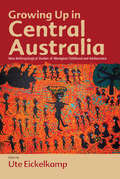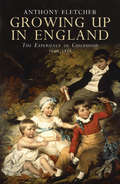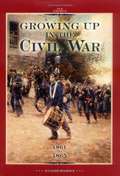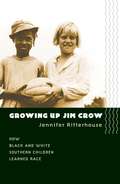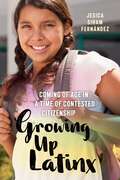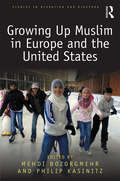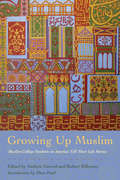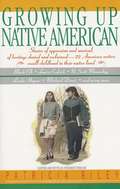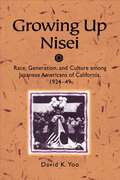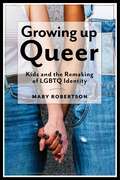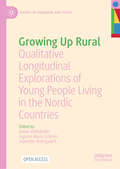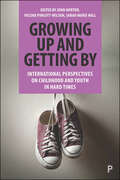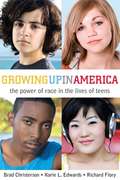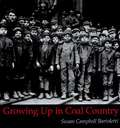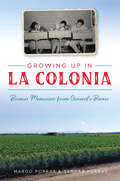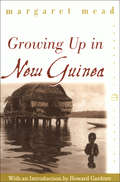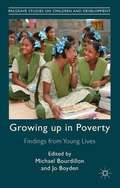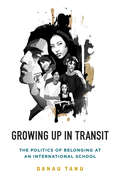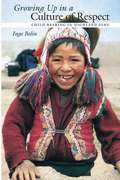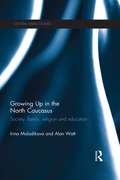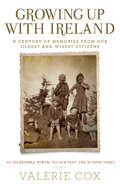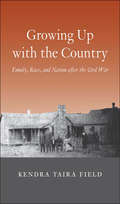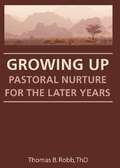- Table View
- List View
Growing Up In Central Australia: New Anthropological Studies of Aboriginal Childhood and Adolescence (Berghahn Ser.)
by Ute EickelkampSurprisingly little research has been carried out about how Australian Aboriginal children and teenagers experience life, shape their social world and imagine the future. This volume presents recent and original studies of life experiences outside the institutional settings of childcare and education, of those growing up in contemporary Central Australia or with strong links to the region. Focusing on the remote communities - roughly 1,200 across the continent - the volume includes case studies of language and family life in small country towns and urban contexts. These studies expertly show that forms of consciousness have changed enormously over the last hundred years for Indigenous societies more so than for the rest of Australia, yet equally notable are the continuities across generations.
Growing Up In England
by Anthony FletcherThis book presents an entirely fresh view of the upbringing of English children in upper and professional class families over three centuries. Drawing on direct testimony from contemporary diaries and letters, the book revises previous understandings of parenting and what it was like to grow up in the period between 1600 and 1914. Using advice literature which set out developing ideologies of childhood, gender and parenting, the book explores the separate but complementary roles of mothers and fathers in raising their children. Male upbringing is discussed in terms of schooling, female through the moral and social context of a domestic schoolroom dominated by a governess. Boys were trained for the world, girls for society and marriage. Rare teenage diaries surviving from the Georgian and Victorian periods show teenagers speaking for themselves about education; relationships with parents, siblings and friends; and their social, class and gender identity.
Growing Up In The Civil War, 1861 To 1865 (Our America)
by Duane DamonLook at life through the eyes of children who lived during different eras of American history... Experience the thrill of landing in the New World for the first time and the terror of dodging bullets during the American Revolution. Journey to the American West in the back of a covered wagon and discover the horrors of the Civil War. From the technological advances of the early twentieth century to the despair of the Great Depression to the sacrifice of World War II, explore each tumultuous time. Our America reveals the true-life adventures of children (many of whom grew up to become presidents or other important national figures), through features such as historical sidebars, quotes from primary resources like diaries and letters, epigraphs, and art authentic to each era. Supports the national curriculum standards Culture; Time, Continuity, and Change; Individual Development and Identity; Individuals, Groups, and Institutions; Power, Authority, and Governance; Global Connections; and Civic Ideas and Practice as outlined by the National Council for the Social Studies.
Growing Up Jim Crow
by Jennifer RitterhouseIn the segregated South of the early twentieth century, unwritten rules guided every aspect of individual behavior, from how blacks and whites stood, sat, ate, drank, walked, and talked to whether they made eye contact with one another. Jennifer Ritterhouse asks how children learned this racial "etiquette," which was sustained by coercion and the threat of violence. More broadly, she asks how individuals developed racial self-consciousness. Parental instruction was an important factor--both white parents' reinforcement of a white supremacist worldview and black parents' oppositional lessons in respectability and race pride. Children also learned much from their interactions across race lines. The fact that black youths were often eager to stand up for themselves, despite the risks, suggests that the emotional underpinnings of the civil rights movement were in place long before the historical moment when change became possible. Meanwhile, a younger generation of whites continued to enforce traditional patterns of domination and deference in private, while also creating an increasingly elaborate system of segregation in public settings. Exploring relationships between public and private and between segregation, racial etiquette, and racial violence, Growing Up Jim Crow sheds new light on tradition and change in the South and the meanings of segregation within southern culture.
Growing Up Latinx: Coming of Age in a Time of Contested Citizenship (Critical Perspectives on Youth)
by Jesica Siham FernándezWinner, Outstanding Scholarly Contribution Award of the Section on Children and Youth, given by the American Sociological AssociationFinalist for the 2021 C. Wright Mills Award, given by the Society for the Study of Social ProblemsLatinx children navigating identity, citizenship, and belonging in a divided America An estimated sixty million people in the United States are of Latinx descent, with youth under the age of eighteen making up two-thirds of this swiftly growing demographic. In Growing Up Latinx, Jesica Siham Fernández explores the lives of Latinx youth as they grapple with their social and political identities from an early age, and pursue a sense of belonging in their schools and communities as they face an increasingly hostile political climate.Drawing on interviews with nine-to-twelve-year-olds, Fernández gives us rare insight into how Latinx youth understand their own citizenship and bravely forge opportunities to be seen, to be heard, and to belong. With a compassionate eye, she shows us how they strive to identify, and ultimately redefine, what it means to come of age—and fight for their rights—in a country that does not always recognize them. Fernández follows Latinx youth as they navigate family, school, community, and country ties, richly detailing their hopes and dreams as they begin to advocate for their right to be treated as citizens in full. Growing Up Latinx invites us to witness the inspiring power of young people as they develop and make heard their political voices, broadening our understanding of citizenship.
Growing Up Muslim in Europe and the United States (Studies in Migration and Diaspora)
by Philip Kasinitz Medhi BozorgmehrThis volume brings together scholarship from two different, and until now, largely separate literatures—the study of the children of immigrants and the study of Muslim minority communities—in order to explore the changing nature of ethnic identity, religious practice, and citizenship in the contemporary western world. With attention to the similarities and differences between the European and American experiences of growing up Muslim, the contributing authors ask what it means for young people to be both Muslim and American or European, how they reconcile these, at times, conflicting identities, how they reconcile the religious and gendered cultural norms of their immigrant families with the more liberal ideals of the western societies that they live in, and how they deal with these issues through mobilization and political incorporation. A transatlantic research effort that brings together work from the tradition in diaspora studies with research on the second generation, to examine social, cultural, and political dimensions of the second-generation Muslim experience in Europe and the United States, this book will appeal to scholars across the social sciences with interests in migration, diaspora, race and ethnicity, religion and integration.
Growing Up Muslim: Muslim College Students in America Tell Their Life
by Andrew Garrod Robert Kilkenny Eboo Patel"While 9/11 and its aftermath created a traumatic turning point for most of the writers in this book, it is telling that none of their essays begin with that moment. These young people were living, probing, and shifting their Muslim identities long before 9/11. . . . I've heard it said that the second generation never asks the first about its story, but nearly all the essays in this book include long, intimate portrayals of Muslim family life, often going back generations. These young Muslims are constantly negotiating the differences between families for whom faith and culture were matters of honor and North America's youth culture, with its emphasis on questioning, exploring, and inventing one's own destiny. "--from the Introduction by Eboo Patel In Growing Up Muslim, Andrew Garrod and Robert Kilkenny present fourteen personal essays by college students of the Muslim faith who are themselves immigrants or are the children of immigrants to the United States. In their essays, the students grapple with matters of ethnicity, religious prejudice and misunderstanding, and what is termed Islamophobia. The fact of 9/11 and subsequent surveillance and suspicion of Islamic Americans (particularly those hailing from the Middle East and the Asian Subcontinent) have had a profound effect on the lives of these students. The shift in official policies and everyday habits that occurred subsequent to the attacks on New York and Washington D. C. has had an influence on the lives of these undergraduates, their families, and their communities of origin.
Growing Up Native American
by Bill Adler Patricia Riley Ines HernandezStories of oppression and survival, of heritage denied and reclaimed -- twenty-two American writers recall childhood in their native land.
Growing Up Nisei: Race, Generation, and Culture among Japanese Americans of California, 1924-49 (Asian American Experience)
by David K. YooThe place occupied by Japanese Americans within the annals of United States history often begins and ends with their cameo appearance as victims of incarceration after the bombing of Pearl Harbor. In this provocative work, David K. Yoo broadens the scope of Japanese American history to examine how the second generation—the Nisei—shaped its identity and negotiated its place within American society. Tracing the emergence of a dynamic Nisei subculture, Yoo shows how the foundations laid during the 1920s and 1930s helped many Nisei adjust to the upheaval of the concentration camps. Schools, racial-ethnic churches, and the immigrant press served not merely as waystations to assimilation but as tools by which Nisei affirmed their identity in connection with both Japanese and American culture. The Nisei who came of age during World War II formed identities while negotiating complexities of race, gender, class, generation, economics, politics, and international relations. A thoughtful consideration of the gray area between accommodation and resistance, Growing Up Nisei reveals the struggles and humanity of a forgotten generation of Japanese Americans.
Growing Up Queer: Kids and the Remaking of LGBTQ Identity (Critical Perspectives on Youth #3)
by Mary RobertsonLGBTQ kids reveal what it’s like to be young and queer today Growing Up Queer explores the changing ways that young people are now becoming LGBT-identified in the US. Through interviews and three years of ethnographic research at an LGBTQ youth drop-in center, Mary Robertson focuses on the voices and stories of youths themselves in order to show how young people understand their sexual and gender identities, their interest in queer media, and the role that family plays in their lives. The young people who participated in this research are among the first generation to embrace queer identities as children and adolescents. This groundbreaking and timely consideration of queer identity demonstrates how sexual and gender identities are formed through complicated, ambivalent processes as opposed to being natural characteristics that one is born with. In addition to showing how youth understand their identities, Growing Up Queer describes how young people navigate queerness within a culture where being gay is the “new normal.” Using Sara Ahmed’s concept of queer orientation, Robertson argues that being queer is not just about one’s sexual and/or gender identity, but is understood through intersecting identities including race, class, ability, and more. By showing how society accepts some kinds of LGBTQ-identified people while rejecting others, Growing Up Queer provides evidence of queerness as a site of social inequality. The book moves beyond an oversimplified examination of teenage sexuality and shows, through the voices of young people themselves, the exciting yet complicated terrain of queer adolescence.
Growing Up Rural: Qualitative Longitudinal Explorations of Young People Living in the Nordic Countries (Studies in Childhood and Youth)
by Kaisa Vehkalahti Ingunn Marie Eriksen Jeanette ØstergaardThis open access book explores the everyday lives of young people living in rural areas in Nordic countries, drawing on qualitative longitudinal methods. The young people&’s life stories are set against a backdrop of Nordic welfare states under increasing global pressure. Growing Up Rural contributes to the growing literature on spatialized youth studies by providing a refreshing antidote to one-sided stories about depraved young lives in rural areas. By drawing on novel empirical analyses of longitudinal data, thereby foregrounding processual shifts and changes over time, it highlights the vast varieties in young people&’s lives as well as the agency and navigation skills required to master vulnerabilities in transitions to adulthood. It contributes to ongoing discussions about how longitudinal qualitative research design provides a deeper understanding of the lives of young people as they unfold. This book provides useful and inspiring insights for scholars and students of youth studies, rural studies, life course studies, and qualitative research more generally.
Growing Up Transnational, Identity and Kinship in a Global Era
by May Friedman Silvia SchultermandlStereotypes and cultural imperialism often provide a framework of fixed characteristics for postmodern life, yet fail to address the implications of questions such as, "Where are you from?" Growing Up Transnational challenges the assumptions behind this fixed framework to look at the interconnectivity, conflict, and contradictions within current discussions of identity and kinship.This collection offers a fresh, feminist perspective on family relations, identity politics, and cultural locations in a global era. Using an interdisciplinary approach from fields including gender studies, postcolonial theory, and literary theory, this volume questions the concept of hybridity and the tangible implications of assumed identities. The rich personal narratives of the authors explore hyphenated identities, hybridized families, and the challenges and rewards of lives on and beyond borders. The result is a new transnational sensibility that explores the redefinition of the self, the family, and the nation.
Growing Up and Getting By: International Perspectives on Childhood and Youth in Hard Times
by John Horton, Helena Pimlott-Wilson and Sarah Marie HallBringing together new, multidisciplinary research, this book explores how children and young people across Europe, Asia, Africa and the Americas experience and cope with situations of poverty and precarity. It looks at the impact of neoliberalism, austerity and global economic crisis, evidencing the multiple harms and inequalities caused. It also examines the different ways that children, young people and families ‘get by’ under these challenging circumstances, showing how they care for one another and envisage more hopeful socio-political futures.
Growing Up in America: The Power of Race in the Lives of Teens
by Brad Christerson Korie L. Edwards Richard FloryThe detailed analysis of this work is based mainly on the results of the National Survey of Youth and Religion, carried out in 2002-3 among a random sample of teenagers and their parents in the US, including 267 in-depth interviews. The book's focus is on the four social institutions of family, peers, school and religion, with discussion of the teens' attitudes and behaviors in these categories with regard to such topics as their future aspirations, relationship to parents, sexual activity, drug and alcohol use, and school performance. The analysis of each topic is supported by extended material from the interviews, which give the reader a vivid sense of the teenager's beliefs and experiences. The volume was written by three sociologists: Christerson (Biola U.), Korie L. Edwards (Ohio State U.), and Richard Flory (U. of Southern California). Annotation ©2010 Book News, Inc., Portland, OR (booknews.com)
Growing Up in Coal Country
by Susan Campbell BartolettiThrough interviews, newspaper accounts, and other original sources, Bartoletti pieced together a picture of life in the Pennsylvania coal mines at the turn of the century.
Growing Up in La Colonia: Boomer memories from Oxnard's barrio
by Margo Porras Sandra PorrasLa Colonia is half a square mile of land separated from the rest of Oxnard by the railroad tracks and home to the people who keep an agricultural empire running. In decades past, milpas of corn and squash grew in tiny front yards, kids played in the alleys and neighbors ran tortillerias out of their homes. Back then, it was the place to get the best raspadas on Earth. It was a home to Cesar Chavez and a campaign stop for presidential candidate Robert Kennedy. As one Colonia native put it, "We may not have had what the other kids had, but we were just as rich." Through the voices of the people, the authors share the challenges and triumphs of growing up in this treasured place.
Growing Up in New Guinea
by Margaret MeadFollowing the sensational success of her first book, Coming of Age in Samoa, Margaret Mead continued her brilliant work in Growing Up in New Guinea, detailing her study of the Manus, a New Guinea people still untouched by the outside world when she visited them in 1928. She lived in their noisy fishing village at a pivotal time -- after warfare had vanished but before missions and global commerce had begun to change their lives. She developed fascinating insights into their family lives, exploring their attitudes toward sex, marriage, the rearing of children, and the supernatural, which led her to see intriguing parallels with modern Western society. Reissued for the centennial of her birth and featuring introductions by Howard Gardner and Mead's daughter, Mary Catherine Bateson, this book offers important anthropological insights into human societies and vividly captures a vanished way of life.
Growing Up in Poverty
by Jo Boyden Michael BourdillonThis book presents the latest evidence from Young Lives, a unique international study of children and poverty. It shows how the persistence of inequality amid general economic growth is leaving some extremely poor children behind, despite the promises of the Millennium Development Goals.
Growing Up in Transit: The Politics of Belonging at an International School
by Danau TanuIn this compelling study of the children of serial migrants, Danau Tanu argues that the international schools they attend promote an ideology of being "international" that is Eurocentric. Despite the cosmopolitan rhetoric, hierarchies of race, culture and class shape popularity, friendships and romance on campus. By going back to high school for a year, Tanu befriended transnational youth, often called "Third Culture Kids", to present their struggles with identity, belonging and internalized racism in their own words. The result is the first engaging, anthropological critique of the way Western-style cosmopolitanism is institutionalized as cultural capital to reproduce global socio-cultural inequalities.
Growing Up in a Culture of Respect
by Inge Bolin"This is a wonderful book, a brilliant book, one that explains Andean culture in a totally unique and fascinating way. . . . Professor Bolin's truly wonderful powers of observation and her sensitivity and receptiveness to Chillihuani culture combine to provide us with a rare opportunity to see and begin to understand a beautiful people whose culture could not be more different from that of the so-called western world. "-Thomas M. Davies, Jr. , Professor Emeritus of Latin American History and Director Emeritus, Center for Latin American Studies, San Diego State University"Societal changes have consequences, and how a people choose to raise their children reveals much about their values and spirit of place. Andean children, (though living with material scarcity), are fully entwined in a network of reciprocal obligations, thereby discovering the meaning of being human. It is this culture of respect that Inge Bolin reveals in this splendid and original book. "-Wade Davis, Explorer-in-Residence, National Geographic Society, author of One River and The Serpent and the RainbowFar from the mainstream of society, the pastoral community of Chillihuani in the high Peruvian Andes rears children who are well-adjusted, creative, and curious. They exhibit superior social and cognitive skills and maintain an attitude of respect for all life as they progress smoothly from childhood to adulthood without a troubled adolescence. What makes such child-rearing success even more remarkable is that "childhood" is not recognized as a distinct phase of life. Instead, children assume adult rights and responsibilities at an early age in order to help the community survive in a rugged natural environment and utter material poverty. This beautifully written ethnography provides the first full account of child-rearing practices in the high Peruvian Andes. Inge Bolin traces children's lives from birth to adulthood and finds truly amazing strategies of child rearing, as well as impressive ways of living that allow teenagers to enjoy the adolescent stage of their lives while contributing significantly to the welfare of their families and the community. Throughout her discussion, Bolin demonstrates that traditional practices of respect, whose roots reach back to pre-Columbian times, are what enable the children of the high Andes to mature into dignified, resilient, and caring adults.
Growing Up in the North Caucasus: Society, Family, Religion and Education (Central Asian Studies)
by Alan Watt Irina MolodikovaInvestigating changes in upbringing in the North Caucasus, a region notorious for violent conflict, this book explores the lives of the generation born after the dissolution of the USSR who grew up under conditions of turmoil and rapid social change. It avoids the ‘traditional’ presentation of the North Caucasus as a locus of violence, and instead presents the life of people in the region through the lens of the young generation growing up there. Using focus groups with teachers and students of different ethnic groups, as well as surveys and essays written by children, the book suggests that while the legacy of conflict plays a role in many children’s lives, it is by no means the only factor in their upbringing. It explores how conflict has influenced upbringing, and goes on to consider factors such as the revival of religion, the impact of social and economic upheaval, and the shifting balance between school and parents. As well as revealing the dynamic influences on children’s upbringing in the region, the book presents recommendations on how to address some of the challenges that arise. The role of government in education is also evaluated, and prospects for the future are considered. The book is useful for students and scholars of Education, Sociology and Central Asian Studies.
Growing Up with Ireland: A Century of Memories from Our Oldest and Wisest Citizens
by Valerie Cox'An incredible portal to our past' The Sunday TimesOn 7 January 1922, Ireland became a free state. Born into that era of turbulence and hope were the twenty-six women and men whose stories and memories of a lifetime are captured by cherished Irish journalist Valerie Cox. From living memory come stories of the arrival of electricity, story-telling at 'rambling houses', raising a family in an earlier era, the scourge of TB, the big snow of 1932 and hiding out when the Black and Tans raided. These evocative pieces reflect both a simpler time and a tougher one, where childhood was short and the world of work beckoned from an early age.Growing Up With Ireland is a compelling portrait of an Ireland in some ways warmly familiar, and in others changed beyond recognition, from those who were there at the beginning.'A comprehensive and evocative insight into a century of Irish life ... a valuable record' Irish Examiner
Growing Up with Ireland: A Century of Memories from Our Oldest and Wisest Citizens
by Valerie Cox'An incredible portal to our past' The Sunday TimesOn 7 January 1922, Ireland became a free state. Born into that era of turbulence and hope were the twenty-six women and men whose stories and memories of a lifetime are captured by cherished Irish journalist Valerie Cox. From living memory come stories of the arrival of electricity, story-telling at 'rambling houses', raising a family in an earlier era, the scourge of TB, the big snow of 1932 and hiding out when the Black and Tans raided. These evocative pieces reflect both a simpler time and a tougher one, where childhood was short and the world of work beckoned from an early age.Growing Up With Ireland is a compelling portrait of an Ireland in some ways warmly familiar, and in others changed beyond recognition, from those who were there at the beginning.'A comprehensive and evocative insight into a century of Irish life ... a valuable record' Irish Examiner
Growing Up with the Country: Family, Race, and Nation after the Civil War
by Kendra Taira FieldThe masterful and poignant story of three African-American families who journeyed west after emancipation, by an award-winning scholar and descendant of the migrants Following the lead of her own ancestors, Kendra Field’s epic family history chronicles the westward migration of freedom’s first generation in the fifty years after emancipation. Drawing on decades of archival research and family lore within and beyond the United States, Field traces their journey out of the South to Indian Territory, where they participated in the development of black and black Indian towns and settlements. When statehood, oil speculation, and Jim Crow segregation imperiled their lives and livelihoods, these formerly enslaved men and women again chose emigration. Some migrants launched a powerful back-to-Africa movement, while others moved on to Canada and Mexico. Their lives and choices deepen and widen the roots of the Great Migration. Interweaving black, white, and Indian histories, Field’s beautifully wrought narrative explores how ideas about race and color powerfully shaped the pursuit of freedom.
Growing Up: Pastoral Nurture for the Later Years
by William M Clements Thomas B RobbGrowing Up: Pastoral Nurture for the Later Years is a sensitive volume devoted to helping older adults retain their status as meaningful members of their congregations and communities. In an honest approach, based on the foundations that old age is supposed to happen, the future belongs to the old, and vocation for people of faith is lifelong, Thomas Robb provides personal and Biblical perspectives, as well as research from over 20 years as a pastor, on the life process and the feelings, worries, and expectations accompanying growing up and growing old. He then molds these concerns into a challenge for congregations and their spiritual leaders to actively assist the aged in coping with and overcoming fears and barriers limiting the fullest expression of faith in God. This insightful book describes the tasks and suggests programs for pastors and congregations everywhere in meeting the challenge, making life for the aged more than shuffleboard and bingo, pot-luck dinners and day trips. Dimensions of pastoral ministries that nurture women and men who, at midlife and beyond, seek to find their way through the unexpected and unplanned, through the third of life following parenthood and careers, are described in detail. Pastors, church leaders, congregations, professors of courses in ministry and aging, aging church members, and seminary students will benefit immensely from the wealth of information presented in Growing Up: Pastoral Nurture for the Later Years.
